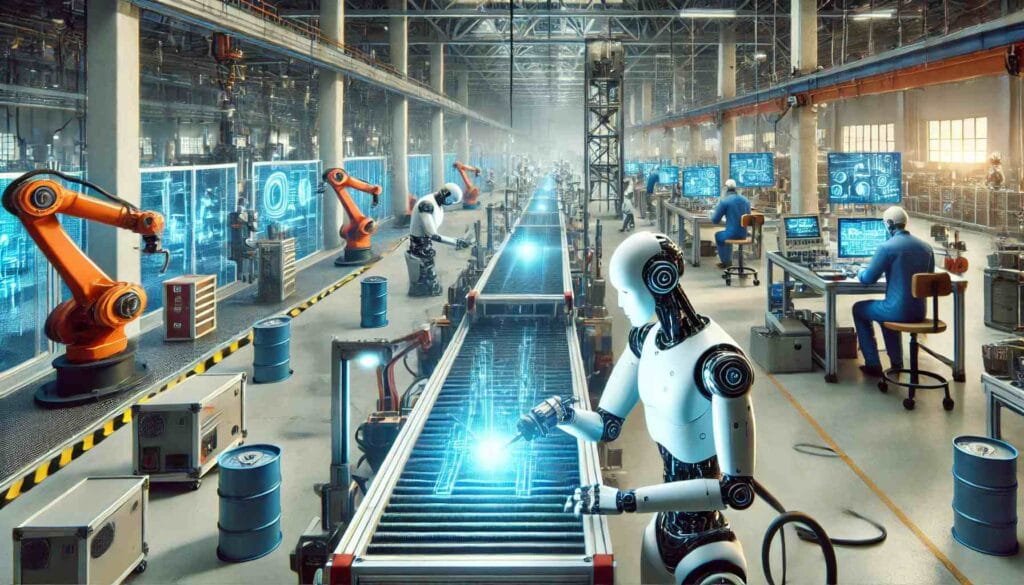The Role of Artificial Intelligence in the Automation Industry

The automation industry has undergone significant transformations in recent years, largely due to the advancements in artificial intelligence (AI). AI technologies are revolutionizing how industries operate, enhancing efficiency, precision, and the ability to perform complex tasks with minimal human intervention. This article explores the pivotal role that AI plays in the automation industry, examining its benefits, applications, and future potential.
What is Artificial Intelligence?
Artificial Intelligence refers to the simulation of human intelligence processes by machines, especially computer systems. These processes include learning (the ability to improve performance based on experience), reasoning (solving problems and making decisions), and self-correction. AI is used in a wide range of applications, including machine learning, natural language processing, robotics, and expert systems.
AI’s Impact on Automation
The integration of AI into automation systems has led to significant improvements in productivity, safety, and reliability across industries. Here are some ways AI is transforming automation:
1. Increased Efficiency and Productivity
AI enables machines to perform tasks autonomously, reducing the need for human intervention. This leads to faster production cycles and higher output. For example, AI-driven robots in manufacturing plants can work 24/7 without breaks, significantly increasing production rates.
2. Predictive Maintenance
AI can predict when machinery is likely to fail by analyzing data from sensors embedded in the equipment. Predictive maintenance helps reduce downtime by allowing companies to service equipment before it breaks down, preventing costly repairs and interruptions in production.
3. Quality Control
AI-powered computer vision systems are being used to detect defects in products during the production process. These systems can quickly identify faults that might go unnoticed by human workers, ensuring higher-quality products and reducing waste.
4. Smart Robotics
Robots equipped with AI can perform more complex tasks, such as assembling intricate parts or interacting with their environment in a more adaptive way. These smart robots are also capable of learning from their experiences and improving their performance over time.
5. Supply Chain Optimization
AI is enhancing supply chain management by analyzing large amounts of data to forecast demand, optimize inventory, and streamline logistics. AI algorithms can predict changes in customer demand and supply fluctuations, helping businesses make better decisions and reducing operational costs.
Applications of AI in Automation
The applications of AI in automation are widespread across various industries. Here are some key examples:
Manufacturing
In manufacturing, AI is used to automate production lines, improve safety, and monitor machinery health. Robotic arms equipped with AI can handle tasks like welding, painting, and assembly, while AI-based quality control systems detect defects in real-time.
Agriculture
AI is being used to automate tasks such as planting, harvesting, and monitoring crops. AI-powered drones can analyze soil conditions, monitor plant health, and even spray pesticides in a controlled and efficient manner, reducing labor costs and improving crop yields.
Logistics and Warehousing
AI-driven robots in warehouses automate the process of sorting, picking, and packing goods. Machine learning algorithms help optimize routes for delivery trucks, minimizing fuel consumption and improving delivery times.
Healthcare
AI is automating diagnostic processes, such as interpreting medical images and monitoring patient data. AI-driven robots also assist in surgeries, offering high precision and minimizing human error.
The Future of AI in Automation
The potential for AI in the automation industry is enormous, and its future prospects are exciting. As AI technologies continue to advance, the industry will see even more innovative applications. Some of the future trends include:
- Human-AI Collaboration: Rather than replacing humans, AI will increasingly work alongside human workers, augmenting their abilities and enabling them to focus on higher-level tasks.
- Autonomous Vehicles: In logistics, the development of autonomous trucks and drones will revolutionize the way goods are transported, reducing costs and improving efficiency.
- AI in Process Optimization: AI will continue to be used for real-time optimization of production processes, improving resource allocation and energy usage.
- Ethical and Social Considerations: As AI becomes more integrated into automation, it will be essential to address ethical issues related to job displacement, privacy, and security.
Conclusion
AI is playing a crucial role in shaping the future of the automation industry. Its applications are broad, from improving productivity and quality to enhancing supply chain efficiency and automating complex tasks. As technology continues to evolve, AI will undoubtedly drive the next wave of innovation in automation, creating smarter, more efficient systems across industries. The future of automation is intertwined with AI, and those who embrace these advancements will be well-positioned for success in the evolving digital economy.
Source : Medium.com




